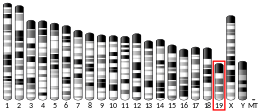CALHM1
Calcium homeostasis modulator 1 (CALHM1) is a pore-forming subunit of a voltage-gated ion channel and a voltage-gated ATP channel that in humans is encoded by the CALHM1 gene.[5][6]
Function
[edit]Central nervous system
[edit]CALHM1 was identified by a tissue-specific gene expression profiling approach[7] that screened for genes located on susceptibility loci for late-onset Alzheimer's disease (AD) and that are preferentially expressed in the hippocampus,[5] a brain region affected early in AD. CALHM1 is a plasma membrane calcium-permeable ion channel regulated by voltage and extracellular calcium levels.[8] The exact function of CALHM1 in the brain is not completely understood, but studies have shown that CALHM1 controls neuronal intracellular calcium homeostasis and signaling, as well as calcium-dependent neuronal excitability and memory in mouse models.[8][9][10] Recent data have also shown that CALHM1 might facilitate the proteolytic degradation of the cerebral amyloid beta peptide, a culprit in AD pathogenesis.[11]
Peripheral taste system
[edit]CALHM1 is expressed in taste bud cells where it controls purinergic receptor-mediated taste transduction in the gustatory system.[12][13]
See also
[edit]References
[edit]- ^ a b c GRCh38: Ensembl release 89: ENSG00000185933 – Ensembl, May 2017
- ^ a b c GRCm38: Ensembl release 89: ENSMUSG00000079258 – Ensembl, May 2017
- ^ "Human PubMed Reference:". National Center for Biotechnology Information, U.S. National Library of Medicine.
- ^ "Mouse PubMed Reference:". National Center for Biotechnology Information, U.S. National Library of Medicine.
- ^ a b Dreses-Werringloer U, Lambert JC, Vingtdeux V, Zhao H, Vais H, Siebert A, Jain A, Koppel J, Rovelet-Lecrux A, Hannequin D, Pasquier F, Galimberti D, Scarpini E, Mann D, Lendon C, Campion D, Amouyel P, Davies P, Foskett JK, Campagne F, Marambaud P (Jun 2008). "A polymorphism in CALHM1 influences Ca2+ homeostasis, Abeta levels, and Alzheimer's disease risk". Cell. 133 (7): 1149–61. doi:10.1016/j.cell.2008.05.048. PMC 2577842. PMID 18585350.
- ^ Taruno A, Matsumoto I, Ma Z, Marambaud P, Foskett JK (December 2013). "How do taste cells lacking synapses mediate neurotransmission? CALHM1, a voltage-gated ATP channel". BioEssays: News and Reviews in Molecular, Cellular and Developmental Biology. 35 (12): 1111–8. doi:10.1002/bies.201300077. PMC 3981604. PMID 24105910.
- ^ Skrabanek L, Campagne F (Nov 2001). "TissueInfo: high-throughput identification of tissue expression profiles and specificity". Nucleic Acids Research. 29 (21): E102-2. doi:10.1093/nar/29.21.e102. PMC 60201. PMID 11691939.
- ^ a b Ma Z, Siebert AP, Cheung KH, Lee RJ, Johnson B, Cohen AS, Vingtdeux V, Marambaud P, Foskett JK (Jul 2012). "Calcium homeostasis modulator 1 (CALHM1) is the pore-forming subunit of an ion channel that mediates extracellular Ca2+ regulation of neuronal excitability". Proceedings of the National Academy of Sciences of the United States of America. 109 (28): E1963-71. Bibcode:2012PNAS..109E1963M. doi:10.1073/pnas.1204023109. PMC 3396471. PMID 22711817.
- ^ Dreses-Werringloer U, Vingtdeux V, Zhao H, Chandakkar P, Davies P, Marambaud P (Mar 2013). "CALHM1 controls the Ca²⁺-dependent MEK, ERK, RSK and MSK signaling cascade in neurons". J Cell Sci. 126 (Pt 5): 1199–206. doi:10.1242/jcs.117135. PMC 4481642. PMID 23345406.
- ^ Vingtdeux V, Chang EH, Frattini SA, Zhao H, Chandakkar P, Adrien L, Strohl JJ, Gibson EL, Ohmoto M, Matsumoto I, Huerta PT, Marambaud P (Apr 2016). "CALHM1 deficiency impairs cerebral neuron activity and memory flexibility in mice". Sci Rep. 6 (24250): 24250. Bibcode:2016NatSR...624250V. doi:10.1038/srep24250. PMC 4828655. PMID 27066908.
- ^ Vingtdeux V, Chandakkar P, Zhao H, Blanc L, Ruiz S, Marambaud P (May 2015). "CALHM1 ion channel elicits amyloid-β clearance by insulin-degrading enzyme in cell lines and in vivo in the mouse brain". J Cell Sci. 128 (13): 2330–8. doi:10.1242/jcs.167270. PMC 4524106. PMID 25999473.
- ^ Taruno A, Vingtdeux V, Ohmoto M, Ma Z, Dvoryanchikov G, Li A, Adrien L, Zhao H, Leung S, Abernethy M, Koppel J, Davies P, Civan MM, Chaudhari N, Matsumoto I, Hellekant G, Tordoff MG, Marambaud P, Foskett JK (Mar 2013). "CALHM1 ion channel mediates purinergic neurotransmission of sweet, bitter and umami tastes". Nature. 495 (7440): 223–6. Bibcode:2013Natur.495..223T. doi:10.1038/nature11906. PMC 3600154. PMID 23467090.
- ^ Kinnamon SC, Finger TE (Dec 2013). "A taste for ATP: neurotransmission in taste buds". Front Cell Neurosci. 7: 264. doi:10.3389/fncel.2013.00264. PMC 3866518. PMID 24385952.
External links
[edit]- Human CALHM1 genome location and CALHM1 gene details page in the UCSC Genome Browser.
Further reading
[edit]- Moyer BD, Hevezi P, Gao N, Lu M, Kalabat D, Soto H, Echeverri F, Laita B, Yeh SA, Zoller M, Zlotnik A (Dec 2009). "Expression of genes encoding multi-transmembrane proteins in specific primate taste cell populations". PLOS ONE. 4 (12): e7682. Bibcode:2009PLoSO...4.7682M. doi:10.1371/journal.pone.0007682. PMC 2780358. PMID 19997627.
- Moreno-Ortega AJ, Ruiz-Nuño A, García AG, Cano-Abad MF (Jan 2010). "Mitochondria sense with different kinetics the calcium entering into HeLa cells through calcium channels CALHM1 and mutated P86L-CALHM1". Biochemical and Biophysical Research Communications. 391 (1): 722–6. doi:10.1016/j.bbrc.2009.11.127. PMID 19944073.
- Desharnais R, Godin G, Jobin J, Valois P, Ross A (Dec 1990). "Optimism and health-relevant cognitions after a myocardial infarction". Psychological Reports. 67 (3 Pt 2): 1131–1135. doi:10.2466/pr0.1990.67.3f.1131. PMID 2084739. S2CID 46335269.
- Lv RJ, He JS, Fu YH, Shao XQ, Wu LW, Lu Q, Jin LR, Liu H (Apr 2011). "A polymorphism in CALHM1 is associated with temporal lobe epilepsy". Epilepsy & Behavior. 20 (4): 681–5. doi:10.1016/j.yebeh.2011.02.007. PMID 21439911. S2CID 45287698.




